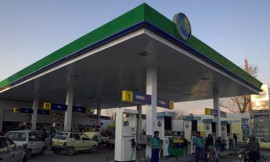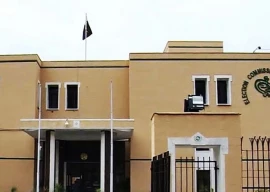
Following an uptick in the international price, the Oil and Gas Regulatory Authority (Ogra) had recommended an increase in the range of 2.8% to 15.6% for November.
PSO sends back ship carrying poor quality petrol
However, Finance Minister Ishaq Dar announced to keep oil prices unchanged during a press conference as the government looks to settle the nerves of the public currently rattled by the ongoing political chaos in Islamabad.
Dar said that the government decided not to pass on the increase in oil prices to the consumers following directions of Prime Minister Nawaz Sharif. “The government has not increased prices of petroleum products since April this year,” said Dar.
The finance minister said the government would bear a revenue loss of around Rs3.5 billion due to its move of keeping oil prices unchanged.
At present, the administration is faced with a stiff protest from Pakistan Tehreek-e-Insaf (PTI) that has announced to march to the federal capital. The opposition party wants the country’s premier to present himself for accountability in the wake of the Panama Papers or step down from his post. The government, in its attempt to appease the masses, has hence decided not to pass on the price-increase.
All time high: US oil prices close at $51.35 a barrel, highest for 2016
In its summary to the government, Ogra had calculated the potential hike in petroleum products by keeping in view fluctuations in the international market and the oil pricing mechanism; it concluded that if the current high tax rate is to be maintained then an increase in oil prices has to be enforced.
Despite over 50% decline in global prices, consumers have largely been denied a full relief in previous months due to hefty taxes. At present, two types of taxes are being charged from oil consumers including petroleum levy and general sales tax.
The regulator had recommended an increase of Rs2 in the price of High Speed Diesel (HSD), a 2.8% change that would have taken the price from Rs72.52 to Rs74.52 per litre. HSD is mostly used in the transport and agriculture sectors.
Surplus: Oil glut to last until mid-2017, says IEA
The regulator had also proposed an increase in the price of petrol by Rs2.29 per litre (3.6%) from Rs64.27 to Rs66.56 per litre. The price of kerosene oil, used for cooking purposes in remote areas where liquefied petroleum gas is not readily available, was recommended to be increased by Rs6.75 per litre (15.6%) from Rs43.25 to Rs50 per litre.
Similarly, the price of LDO, mainly used for industrial purposes, was suggested to increase by Rs6.40 (14.8%), up from Rs43.35 to Rs49.74 per litre.
Published in The Express Tribune, November 1st, 2016.
Like Business on Facebook, follow @TribuneBiz on Twitter to stay informed and join in the conversation.


































1713853507-0/MalalaHilary-(2)1713853507-0-270x192.webp)








COMMENTS
Comments are moderated and generally will be posted if they are on-topic and not abusive.
For more information, please see our Comments FAQ